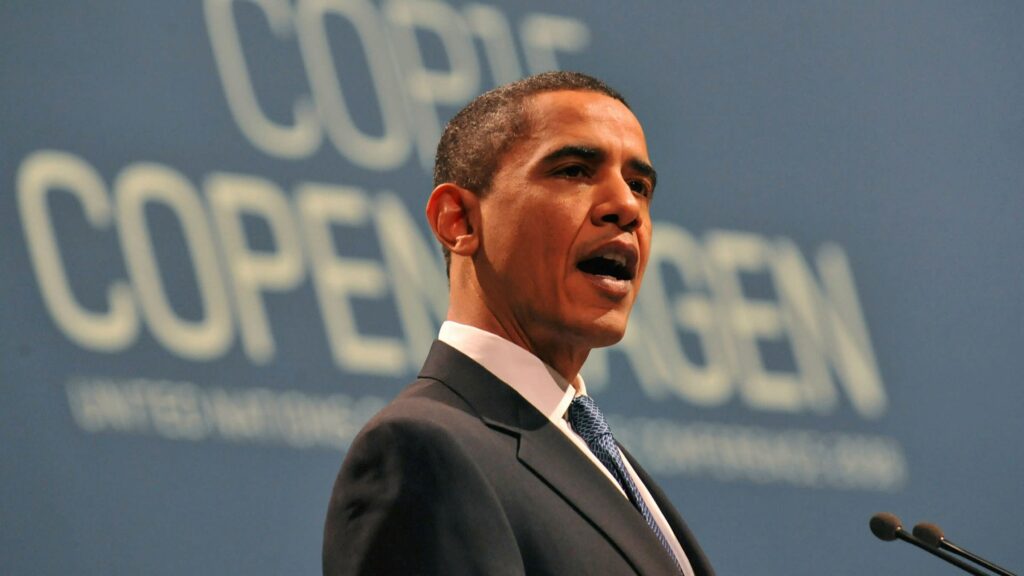COP26 is haunted by the shadow of Copenhagen


The queues are so bad that thousands of people have been left shivering outside in the cold. A US Democratic president has arrived without the landmark climate change legislation he is still struggling to push through Congress. Poor countries say rich ones have failed to live up to past climate promises, and the bleak shadow of a global crisis hangs over the entire event.
So goes the COP26 climate summit that opened in Glasgow this week. But it is what happened at another UN climate conference that evokes such bitter memories that survivors still shudder at any mention of “the C word”.
C stands for Copenhagen, the Danish city that hosted another huge UN climate meeting in the icy December of 2009.
As in Glasgow, expectations for Copenhagen were enormous, so much so that the meeting was branded Hopenhagen. Yet it ended in such dismal acrimony that the city remains a byword for failure to tackle climate change.
Glasgow has a different agenda and global climate action has shifted dramatically in the intervening 12 years. Yet there are enough parallels between the two meetings to offer a sobering reminder of how much depends on the outcome of the Glasgow summit, due to end next Friday.
In 2009, the US president, Barack Obama, had declared climate a priority, but a bill to achieve action stalled in the Senate. His Democratic successor, Joe Biden, arrived in Glasgow this week with an equally troubled hand to play as he battles for congressional approval of sweeping climate plans.
While Copenhagen came in the wake of a global financial crisis, a global health crisis has dogged Glasgow. The queues were worse in Copenhagen, which lacked the excuse of a pandemic. But more than one veteran negotiator arriving in Glasgow said Copenhagen was on their mind, even though the technical differences between the two gatherings are significant.
In Copenhagen, the EU and other wealthy nations wanted a new treaty to replace the 1997 Kyoto protocol, which the US signed but failed to ratify and then abandoned.
All countries were supposed to arrive in Glasgow with fresh voluntary commitments to cut their emissions under the 2015 Paris accord, which eventually replaced the Kyoto treaty.
Much else has changed in the past 12 years. Crucially, scientists have shown that emissions must nearly halve by 2030 and reach net zero by 2050 to have a good chance of keeping global warming to 1.5C, the safest temperature goal in the Paris agreement.
As a result, we live in a net zero-focused world, where an electric car company that was only six years old in 2009 has a market value of $1tn and an activist hedge fund has installed directors on ExxonMobil’s board to push the oil company harder on the energy transition.
COP26 will be judged by the extent to which it helps efforts to stick to the 1.5C limit. Signs so far are encouraging but not staggering. India’s 2070 net zero target is typical: a serious step forward in commitment but lacking vital details such as a deadline for phasing out coal, the dirtiest source of electricity.
Rich countries, meanwhile, have failed to deliver $100bn a year in climate finance to poorer ones by 2020, a pledge first made in, ahem, Copenhagen.
Still, there are some reasons for optimism. Ahead of the Glasgow summit, it was estimated that the world was on track for more than two degrees centigrade of warming. Unofficial snap analysis suggests if all this week’s promises are met, it could be as low as 1.9C.
Let’s hope this good news lasts. Critics may deride these vast climate COPs as elaborate time-wasting exercises, but they spur countries to act in a way few would do on their own. That, in turn, helps to speed green investment and innovation.
For Copenhagen veterans in Glasgow, the risks in Scotland are clear.
“The worst Glasgow outcome would be one where there has been so little progress or agreement that businesses and investors — and voters — start doubting whether it is worth putting more effort and money into decarbonisation plans and investment projects,” says Professor Michael Jacobs of the University of Sheffield, a UK climate negotiator in 2009. “We saw this happen after Copenhagen.”
It is tempting to think the world has changed so much that businesses will fill any gaps that governments leave at COP26. Tempting but wrong. The world needs a resounding signal that governments are determined to tackle the greatest threat to future generations, now more than ever.